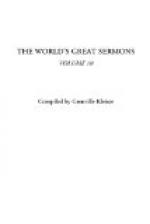At certain epochs a word was as good as a man. It was an act total, supreme, guaranteed by the whole of life. There was no need to sign, to stamp, to legalize. Speech was held between friends and enemies alike, more sacred than any sanctuary, and man maintained it, with the obscure but just sentiment that it is at the base of society, and that if words lose their value, there is no longer any society possible. Later the written word was considered sacred. And coming nearer to our own day, we have been able to see the masses, guided ever by that quite legitimate sentiment of the holiness of speech, regard everything printed as gospel truth. Those times are no more. We have lied too much, by the living word, the pen, and the press. We have said and printed too much that is light, false, wittingly disfigured. Armed with an instrumentality that multiplies thought and spreads it broadcast to the four corners of the earth with a rapidity unknown to our fathers, we have made use of it, for the most part, to extend slander more widely and to cause a greater amount of doubtful intelligence to swarm upon the earth. So well have we spun speech out in all our mouths, so thoroughly have we deprived it of its proper nature and caused it to become sophisticated, that it is no longer of the least value. The confidence of the masses in authority, which is one of the slowest and most difficult conquests of humanity, we have lost like a thing of no worth. They no longer say to any one who now lifts up his voice: Who are you? But: What end have you in view? What party do you serve? By what interest are you led? By whom have you been bought? That there may be a sacred truth, loved, respected, adored; a truth that is worth more than life, to which one may give himself wholly and with happiness—this idea diverts the cynics and makes those whom the cruel experiences of life have rendered distrustful, shake their heads. If ever an epoch has needed to rehabilitate human speech, it is our own. What good are we if it is good for nothing, since it is at the root of all our institutions?
Who will give it back its potency?—They who will know how to resign themselves to being but a voice!
Permit me to bring home to you, by means of a very modest example, what man may gain in force by being but a voice. Look at that clock. When the hour has come, it marks it. Whether it be the hour of birth or of death, the hour of joy or of sorrow, the hour of longed-for meetings, or of heart-breaking farewells, the clock strikes that hour. It is only a mechanism, but it is scrupulously exact, it measures that time which descends to us drop by drop from the bosom of eternity, and when the hammer falls on the brazen bell, the entire universe confirms what it announces. The suns and the worlds mark at this very moment, in the immortal light, the same point of time that is indicated below on earth, some starless night, by the humblest village clock.




